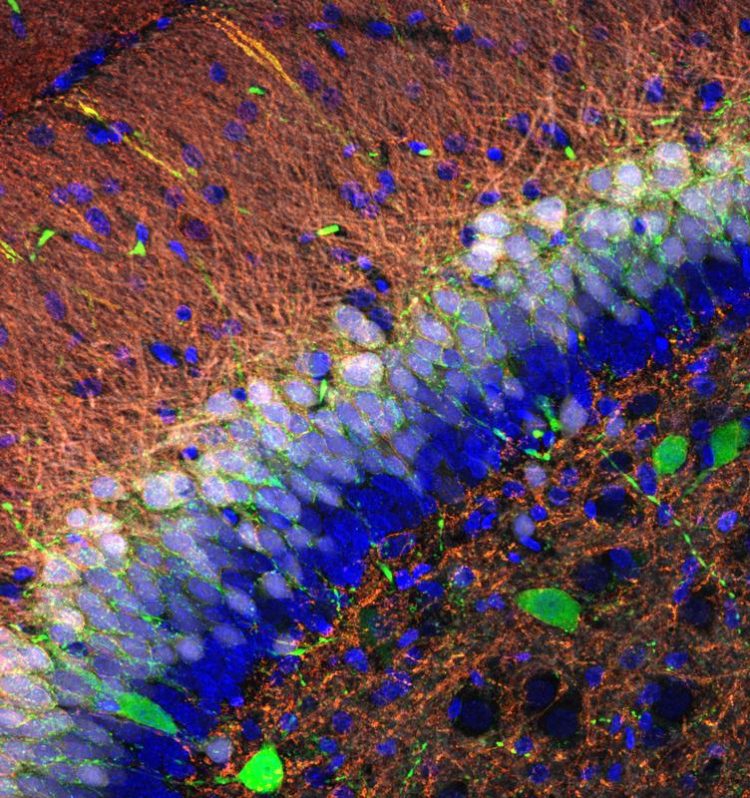Between Arousal and Inhibition

Granule cells (blue) process and encipher information and assemble it into a kind of map in the dentate gyrus. Source: Nature Communications
The dentate gyrus is the “input point” for the hippocampus part of the brain. It transmits information from the short term memory to the long term. It consists of granule cells, which are especially dense in this area of the brain, and interneurons, which are linked up in the central or peripheral nervous system between several nerve cells and have an inhibiting effect on their activity. Both types of cell process information and differentiate closely-related memories.
A team headed by Prof. Dr. Marlene Bartos from the Institute of Physiology I of the University of Freiburg, which also includes lead author Dr. Claudio Elgueta, has found why granule cells and interneurons process incoming signals differently: they have fundamentally different structures and functional characteristics. The work group has published its results in the journal Nature Communications.
The dendritic appendages of the nerve cells receive incoming signals rather similarly to antennae. Interneurons can be severely inhibited by chloride transporters, which enhance the inhibitory signals, and the high density of GABAA receptors. These interneurons do not directly process information but determine which granule cells are involved in information processing. Granule cells on the other hand have lower densities of GABAA receptors and are mildly inhibited: they process and encipher signals from the environment which results in a map-like representation of the environment in the dentate gyrus.
If the degree of inhibition in the brain cells changes, malfunctions can arise in the processing, enciphering and accessing of information. This can impair memory function and lead to neurological disorders. These results are a contribution to a better understanding of the mechanisms of information processing in the central nervous system.
Since 2018 Marlene Bartos and her team have received an Advanced Grant of 2.5 million euros from the European Research Council (ERC).
Prof. Dr. Marlene Bartos
Institute of Physiology I
Tel.: + 49 761 203-5150
marlene.bartos@physiologie.uni-freiburg.de
Dr. Claudio Elgueta
Institute of Physiology I
Tel.: +49 761 203-5155
claudio.elgueta@physiologie.uni-freiburg.de
Elgueta, C., Bartos, M. (2019): Dendritic inhibition differentially regulates excitability of dentate gyrus parvalbumin-expressing interneurons and granule cells. In: Nature Communications 10. DOI: 10.1038/s41467-019-13533-3
Weitere Informationen:
https://www.pr.uni-freiburg.de/pm-en/press-releases-2019/between-arousal-and-inh…
Media Contact
All latest news from the category: Health and Medicine
This subject area encompasses research and studies in the field of human medicine.
Among the wide-ranging list of topics covered here are anesthesiology, anatomy, surgery, human genetics, hygiene and environmental medicine, internal medicine, neurology, pharmacology, physiology, urology and dental medicine.
Newest articles

First-of-its-kind study uses remote sensing to monitor plastic debris in rivers and lakes
Remote sensing creates a cost-effective solution to monitoring plastic pollution. A first-of-its-kind study from researchers at the University of Minnesota Twin Cities shows how remote sensing can help monitor and…

Laser-based artificial neuron mimics nerve cell functions at lightning speed
With a processing speed a billion times faster than nature, chip-based laser neuron could help advance AI tasks such as pattern recognition and sequence prediction. Researchers have developed a laser-based…

Optimising the processing of plastic waste
Just one look in the yellow bin reveals a colourful jumble of different types of plastic. However, the purer and more uniform plastic waste is, the easier it is to…



